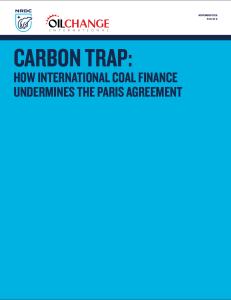
November 2016
Oil Change International and Natural Resources Defense Council
by Han Chen, Alex Doukas, Jake Schmidt, and Sarah Lyn Vollmer
Download the report here.
Download the Executive Summary in Japanese here.
Download the full database here.
Governments have a limited pool of public funds that they can invest in other countries, often in an effort to bring sorely needed energy resources to places without reliable energy access. Unfortunately, these investments often take the form of coal-fired power plants and coal mines, ultimately damaging the air, water, public health, and environment of developing nations under the guise of bringing energy. The costs and life spans of coal projects can stretch for decades, trapping developing nations with incredibly carbon-intensive energy mixes.
It is time to turn this tide toward sustainable, profitable clean energy projects, especially in light of the Paris agreement, which went into force on November 4, 2016. The agreement calls for shifting trillions of investment dollars toward low-emission, climate-resilient development. The world must use its relatively small pool of public finance tools more prudently to catalyze that shift.
Just a few nations within the Group of 20 (G20) account for the vast majority of international coal finance. The export credits used to finance coal mainly benefit businesses in the home countries rather than in the recipient countries. The emerging economies are then left to grapple with the financial, public health, and environmental impacts.
Building on our earlier reports – “Under the Rug” (June 2015) and “Swept Under the Rug” (May 2016) – this report and accompanying database provide a window into coal projects financed by G20 countries.
Download the report here.
Download the Executive Summary in Japanese here.
Download the database used in report here.
